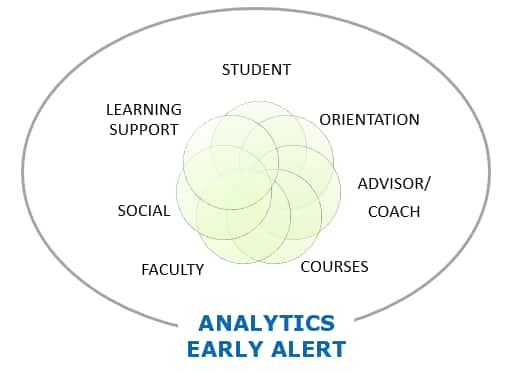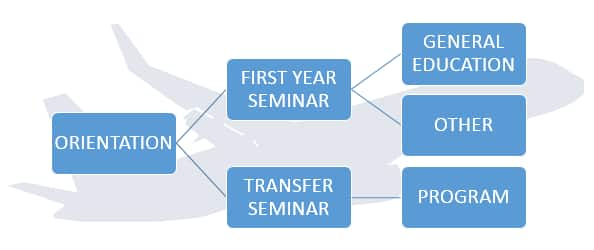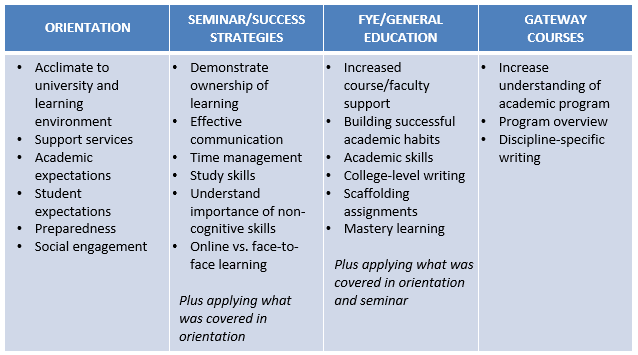The First Year Experience in an Online Environment

Setting the Stage
The first year of college is the most critical time for any student, and especially for at-risk students. A report published by the National Student Clearinghouse Research Center shows that, of first-time students who started in fall of 2012, only 68.7% were enrolled at any institution a year later (persistence) and only 58% were enrolled at the same institution (retention). This means three in 10 students will not return for the second year of learning anywhere and one in nine will return to college, but at another institution. Imagine graduation rates when only 69% of students return for a second year.
According to Clifford Adelman’s “The Toolbox Revisited” and Watson Swail’s “The art of student retention,” between 30% and 40% of all entering freshmen are unprepared for college-level reading, writing and mathematics, and approximately 44% of all college students who complete a two-year or four-year degree had enrolled in at least one remedial/developmental course in reading, writing or math.
As SNHU Online is an open-enrollment institution often serving high-risk, nontraditional learners, here the first year is even more important than in a traditional, brick-and-mortar, institution. As SNHU Online has continued expanding our national footprint, we have seen our students and their needs become more diverse. A major goal of the First Year Experience program at SNHU Online to identify at-risk populations and provide them with the best academic path and resources to succeed and gain the skills necessary to earn their degrees and enter or advance in the workforce as confident, skilled, productive employees.
Goals of a First Year Experience Program
Generally First Year programs set the following major goals for students:
Assist with transitioning into the institution
Build academic skills
Succeed academically in the short- and long-term
Set academic and career goals and create a plan for meeting those goals
Develop a sense of community and relationships with peers, faculty and other university staff
For the 18- to 20-year-olds transitioning into many traditional universities, the focus typically is on university services and degree planning (among other things). Institutions — especially online institutions — that serve the more “nontraditional” learners who are juggling multiple priorities and responsibilities face additional challenges.
For a student who has not engaged in any formal learning for 15 to 20 years, getting back into the groove of formal education can be overwhelming. “Life happens” is a common, realistic reason for an online learner to drop out and, unfortunately, intervention points are not as easy to identify.
Key Components of a First Year Experience (FYE) Program
To accomplish these goals, it’s important to consider which key components/departments to leverage or establish. Here at SNHU Online, we have identified seven major components: the student, orientation, academic advisors/coaches, courses, faculty, social engagement and learning support.

Faculty teaching in the first year plays the most critical role. Faculty who are teaching FYE courses undergo a very rigorous review process prior to hiring to ensure they are fully committed to student success and highly skilled in supporting at-risk populations. They are provided with additional resources and training in the areas of differentiated instruction, customer service, communication and outreach. Ongoing training and communication focuses on support resources, identifying struggling students, and collaborating with academic advisors.
Socially, students need to find ways to engage with their peers, faculty and other university staff. With online learning sometimes having being perceived as “isolating,” it’s important to think about meaningful engagement for the online learner. Not only is social engagement tied closely to persistence and satisfaction, but also to academic performance. At SNHU Online, we have designed opportunities for students to engage with one another both within the learning environment as well as by using our internal social media platform, SNHUconnect. Course- and program-specific learning communities and student lounges promote social engagement and relationship-building outside of the course.
Academic advisors/coaches play a critical role in the First Year Experience at SNHU by helping students set goals and remain engaged, providing social and academic support to overcome challenges, increasing awareness of support services and more. Additionally, the relationship that online advisors have with our faculty is critical. Our New Student Advisors, who work with students during their early experiences, have smaller caseloads to ensure students have the support they need as they acclimate to SNHU Online. Advisors build strong relationships with their students and are able to provide personal, student-specific coaching and support because of these relationships. Faculty and advisors collaborate on a regular basis to make sure that students are making progress towards their goals and discuss strategies to help students who are struggling.
Learning Support services must align with the needs of students related to their courses. SNHU Online has made significant investments in providing high-touch writing support as well as live tutoring and webinars for many of our FYE courses. Writing is a very important aspect of short- and long-term academic and career success, and we have seen a positive impact from our efforts. We continue to try and understand how to best support our students by leveraging additional information, such as non-cognitive factors, course requirements, faculty feedback, etc.
Student Pathways: Orientation, Seminars and General Education
My colleague Jaymes Myers (Part 1, Part 2) has recently written in this blog about the deliberate ways in which we build our learning experiences for our students. Beyond this, work has been done to establish a curriculum framework for designing our first year/gateway course experience that focuses on the goals of the FYE program. The big takeaway: Be intentional. Not only should activities within the course be intentional, but courses themselves should be intuitive, transparent, relevant and clearly aligned to FYE and program goals..
Dr. Gregory Fowler describes the first year experience as a plane during takeoff. There are many forces acting against the plane. On the ground are the friction of the surface, the length of the runway, ground conditions, the weight of the plane, etc. As that plane begins takeoff, speed, acceleration, headwind, drag, air density and more affect it. It isn’t until the plane reaches cruising altitude that the passengers can stop clenching their teeth and squeezing their armrests. Challenges still exist at cruising altitude (life happens situations exert constant gravitational pull), but they are not nearly as frequent and the plane is under better control.

Translating this into the way we have intentionally designed our student experience, we have identified a clear pathway from orientation to program-specific courses. Each experience has a purpose and builds off the experience before it. While many do possess the skills to be successful learners, we don’t assume students are coming to us with them, so our orientation experience is designed with that in mind.
Orientation must prepare the student for digital realities, orient them to the university and their learning environment, introduce them to support services, set appropriate and realistic expectations for online learning, and address the non-academic issues (including motivation) as well as the academic ones (the need for remediation in math or writing, for example). These are introduced in orientation and students are expected to hone these skills and be able to apply these strategies throughout their first year and beyond.
The First Year Seminar can take many forms and serve many functions depending on the needs of the institution, such as an extended orientation or an academic success course. At SNHU Online, this course serves both functions, covering concepts and topics that extend orientation while introducing academic success strategies such as time management, college-level writing and study skills. Online students are enrolled in SNHU 107, Online Success Strategies, during which they undergo diagnostic assessments that are designed to help them, faculty, advisors and university staff understand the types of support, resources and strategies the student will require in order to be successful long-term.

As students progress beyond the orientation and seminar experiences, they enroll in courses (generally General Education courses) that align with, and contribute to, the goals of the first year experience. At SNHU Online, we call these the New Student Core courses. These courses adhere to a clear curriculum framework with significant enhancements in terms of support and collaboration that function as just-in-time resources. Courses in this category are designed specifically to streamline the learning process and provide students with effective, high-quality learning resources. Embedded activities and resources focus on the development of writing proficiency, reading comprehension, quantitative literacy, information literacy, study habits and time management.
From here, students progress with more focus on their program. Program Pathways were implemented for all programs offered by SNHU Online, designed by the dean (in collaboration with advising to consider the non-academic issues that might impact the student experience), and are a high-impact practice for student success and persistence. Providing students with an understanding of the road ahead increases likelihood for graduation.
What We’ve Learned
Unfortunately, there’s no silver bullet or quick fix for a robust first year experience. An FYE program that is designed well focuses on all areas of student success – learning, academic skills, communication, personal growth, grades, retention, diversity, student satisfaction, general education, etc. The challenge remains understanding the complex relationship between student success (grades), retention, learning and the support that goes with it. As important as early term success and persistence are, it’s more important that we are building the skills students need to be successful long-term — academically, in their careers and beyond. This, to me, is the most important goal of any first year program, especially one that supports the online learner.
Explore more content like this article

Associate Degree vs. Bachelor's Degree: What's the Difference?

How to Get a Scholarship (And Why It Matters If You Do)

What is Tuition Reimbursement? The Often-Overlooked Employee Benefit
About Southern New Hampshire University

SNHU is a nonprofit, accredited university with a mission to make high-quality education more accessible and affordable for everyone.
Founded in 1932, and online since 1995, we’ve helped countless students reach their goals with flexible, career-focused programs. Our 300-acre campus in Manchester, NH is home to over 3,000 students, and we serve over 135,000 students online. Visit our about SNHU page to learn more about our mission, accreditations, leadership team, national recognitions and awards.


